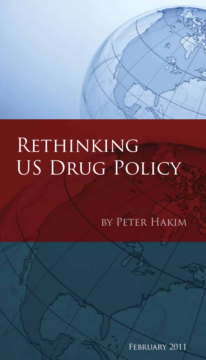This post is also available in: Español
US officials at first aggressively resisted calls from Latin American leaders to make the drug issue a priority for discussion when the hemisphere’s heads of state meet in Cartagena for the Summit of the Americas this April. Not without justification, Washington feared that the Latin Americans were preparing to point their collective finger at US anti-drug policy, making it the culprit for the surge in drug-fueled crime and violence across the region. The US grudgingly retreated, at least partially, and now says it is prepared to talk about drugs at the Summit, but that it has no intention of altering its policy approach.
Among Latin Americas, there is a growing consensus that the root cause of their violent crime wave is the massive use of narcotics in the US—which is overwhelming the world’s largest market for illicit drugs, consuming an estimated $60 billion worth a year. And there is not much question that it is mostly the US’s unceasing demand for drugs and the huge profits it generates that finances organized crime across the region, particularly in Mexico and Central America. Moreover, the US over the years has shown itself unwilling or unable to dampen its demand and curb the flow of money and weapons to criminal gangs.
Nonetheless, Washington’s anxieties about discussing drug policy with hemispheric leaders in Cartagena are exaggerated. The strongest advocates for including drug issues prominently on the Summit agenda are also among the US’s sturdiest allies in the region--Colombia’s Juan Manuel Santos, who will host the meeting, Mexico’s Felipe Calderon, and Guatemala’s Otto Perez Molina. All of them are committed both to battling narcotics trafficking, and to working closely with the US on drug and security matters. They want to generate a debate on policy and strategy—not embarrass the US or put it on trial. They also know this is an election year in the US. Legalization will surely get some attention, but it highly unlikely it will dominate the exchange. It’s a discussion the US president should be able to manage.
Actually, the US should be grateful that the Latin American leaders—presidents, ex-presidents, and many others—have pressed for this debate. There is none in Washington, even though most Americans now believe the drug war has failed. President Obama himself called for, but has not forcefully pursued, major reforms to shift the emphasis of policy from law enforcement to prevention and treatment. Secretary Hillary Clinton has stated that US drug strategies “have clearly not worked.” “How”, she questioned, “could anyone conclude differently?” It will be salutary for the US president to participate in a serious debate on drug issues outside of the politically venomous confines of Washington. And the US will get a forum in which to defend its views, if chooses to.
President Santos and other Colombians should be pleased by their efforts to get drugs onto the agenda. By tackling a high-intensity issue like drug policy frontally, the April Summit will gain significant attention worldwide, and will certainly be more relevant to hemispheric affairs. But, however vigorous the discussion in Cartagena, the outcome will almost surely leave the issues unsettled. The next steps will be crucial.
Ideally, the US, Colombia, and the other countries of the hemisphere should leave Cartagena with a plan to pursue the discussion and put in the work needed to develop new pragmatic approaches to managing illicit drugs and their consequences, unbound by ideology or by the inertia of past policies. And if the US decides that it is not ready to consider new approaches and wants to sticks with costly unworkable policies, then the Latin Americans should proceed on their own. It is their interests that are most at stake.




















